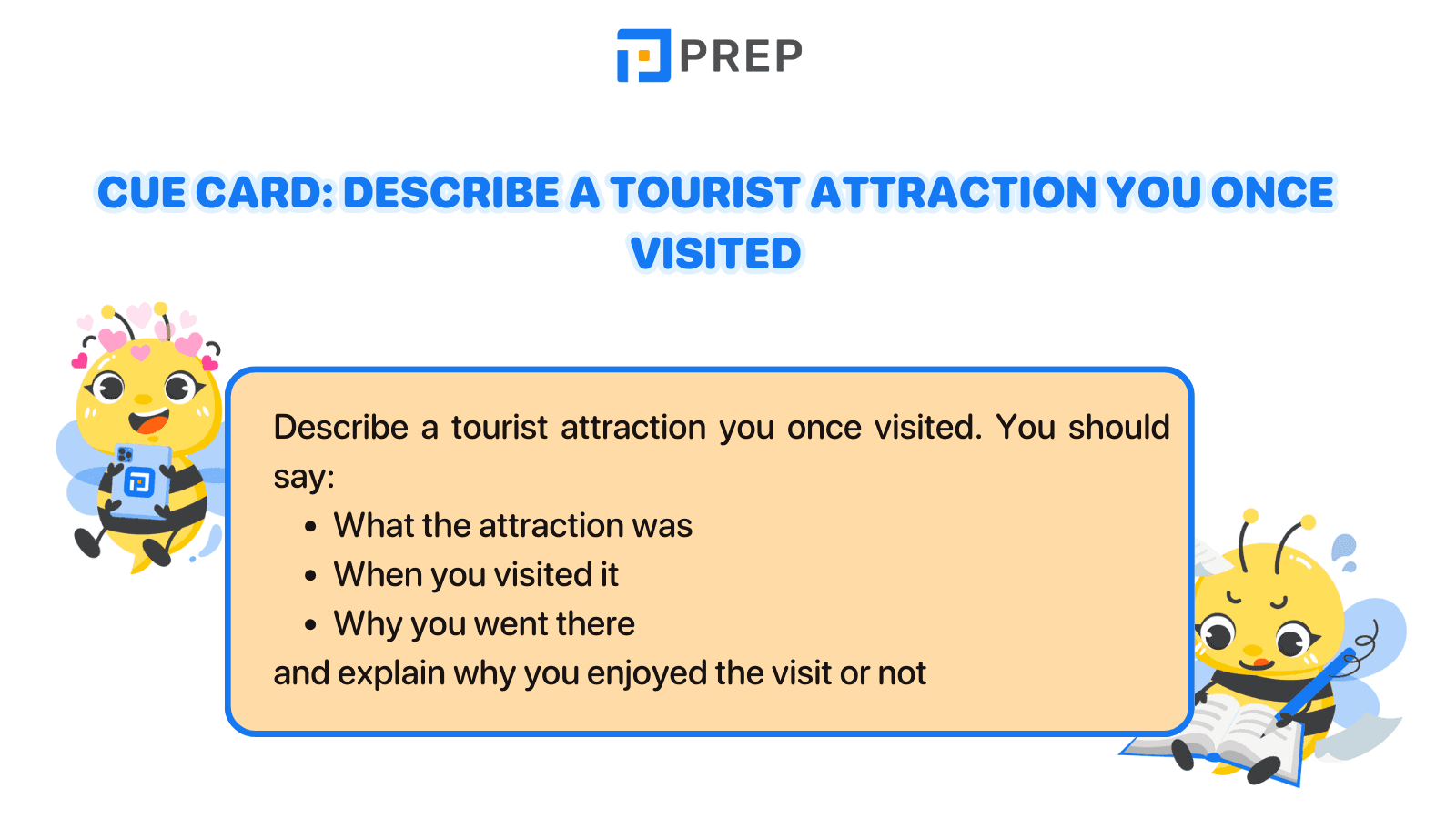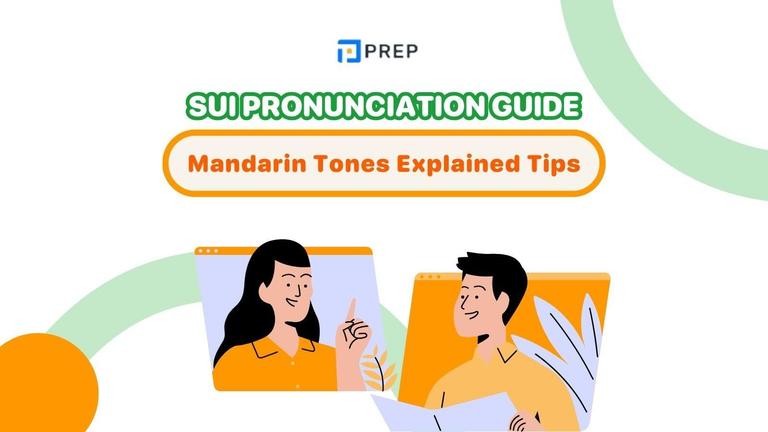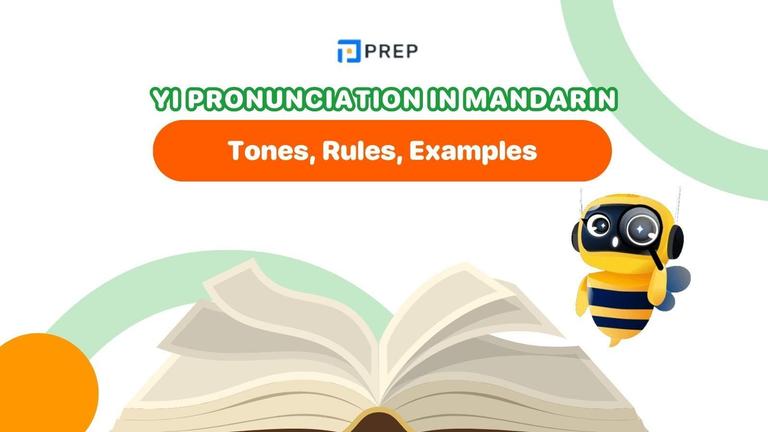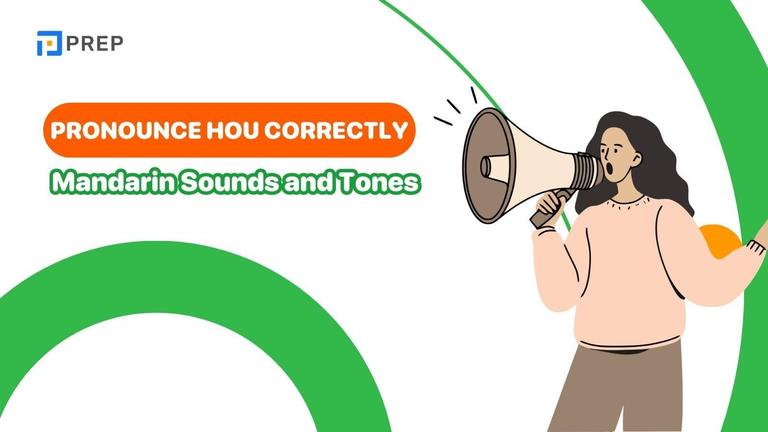Sample Speaking Part 2, 3: Describe a tourist attraction you once visited
Travel and tourism is a very common topic that frequently appears in the IELTS Speaking exam. This is a very familiar subject, so when you encounter the prompt "Describe a tourist attraction you once visited", you may feel quite confident that you've "hit the jackpot", right? However, if you don't have a detailed outline, specific sample essay ideas, and effective note-taking techniques within 1 minute, you certainly won't be able to achieve a high band score.
Let's refer to the sample IELTS Speaking Part 2 + 3 essay on the topic "Describe a tourist attraction you once visited" below. This will not only quickly update you on the latest exam topics, but also serve as an effective way for you to practice speaking, learn new vocabulary, and structures, and develop your ideas.

I. IELTS Speaking Part 2 question and answer: Describe a tourist attraction you once visited
1. Cue card: Describe a tourist attraction that you have visited
Describe a tourist attraction you once visited. You should say:
-
What the attraction was
-
When you visited it
-
Why you went there
and explain why you enjoyed the visit or not

2. Sample idea
-
The task "Describe a tourist attraction you once visited" requires students to describe a tourist attraction:
-
What the attraction is
-
When you visited the place
-
Why you went there
-
Explain why you liked/disliked this trip
-
-
The task "Describe a tourist attraction you once visited" is part of the larger topic of Travelling. To handle this task, the easiest and most effective approach is to closely follow the cues provided in the task and provide the most specific and detailed information possible, avoiding general statements.
-
For the first question, what the attraction is, you simply need to state that it was a place with beautiful scenery. This does not necessarily have to be a place you have actually visited, but rather somewhere that has made an impression on you or somewhere you would like to go. This also helps avoid repeatedly describing the same well-known places that Vietnamese students often use, such as Danang, Hoi An, Nha Trang, which can make the response boring and lacking in elaboration.
-
For the second question, when you visited the place, simply choose any time of the year (a certain season or period) or a special occasion (birthday, holiday) and think about who you went with (family, friends, etc.) or you could even choose to go alone.
-
In the third question, why you went there, you can choose to go with (family, friends, etc.) or even decide to go alone to visit the place for relaxation, exploration, etc.
-
The final question, explaining why you liked/disliked this trip, is usually considered the most important part of the speech.
-
You can devote a large part of your speech to expressing your impressions of the location or the experiences you had there.
-
However, for the type of task "Describe a tourist attraction you once visited," you test-takers can also incorporate your impressions into each part of the answer to the questions above, as long as you accomplish the main objective of using vocabulary to describe the emotions and impressions about a particular location.
-
3. IELTS Speaking Task 2 samples: Describe a tourist attraction you once visited

Let's take a look at the IELTS Speaking Part 2 answer - Describe a tourist attraction you once visited:
I want to call myself a hodophile, a travel lover because whenever I have a chance, I’ll hit the road. I have been to many places, in Vietnam and other countries, and now I’d like to talk about the most recent place I’ve set foot in. That is Hakone, a lovely scenic town in Japan.
I went there last spring on a one-week solo trip to Japan. I was recommended this place by a local friend when I was browsing a travelling guide site. She was also the one who accompanied me to Hakone. To get to the city, I had to take a train from Tokyo’s Shinjuku Station and Hakone’s Yumoto Station via Odakyu Railway. Another alternative is to take the train using Japan Railways, but the fare is slightly higher.
Although I already knew about Hakone's charm, I was still stunned when I got there. From the windows of the train, I could already see the iconic Mount Fuji from afar, which was what I had longed to see. I then met my Japanese friend at Sounzan Station and took the first form of transport, the ropeway, to visit Hakone. Not only did I have a more close-up view of Mount Fuji from the cable car, I also caught a distinct view of the desolate mountainside covered by plumes of smoke in Owakudani. It was actually an active volcanic valley once called Hell Valley.
Then my friend insisted that I try the black eggs, another distinctive thing in Hakone. They are basically chicken eggs but boiled in Owakudani’s natural hot springs, whose water turns the eggshell as black as charcoal, and according to the local lore, eating one of these black eggs adds seven more years to our life. But to be very honest, it tasted like any regular hard-boiled egg to me.
Then, she introduced me to the onsen, which is basically bathing in hot springs but also what Hakone is most well-known for. I had to admit it was indeed a very heavenly experience.
In general, I was totally satisfied with the trip. The experience I had there still lingers until now even though it has already been a year.
Note: The IELTS Speaking Part 2 sample on the topic of "Describe a tourist attraction you once visited" can also be used for other task prompts such as: Describe a tourist attraction you enjoyed visiting, Describe a tourist attraction that you have visited, Describe a tourist attraction you once visited in Vietnam, Describe an interesting tourist destination, etc.
Vocabulary used in the IELTS Part 2 Speaking examples on the topic "Describe a tourist attraction you once visited":
-
Hodophile (n): a person who loves to travel
-
hit the road (phrase): to set out on a journey
-
set foot in (phrase): to arrive at a place
-
Scenic (adj): having many beautiful natural views
-
accompany (v): to go with
-
a solo trip (phrase): a trip alone
-
alternative (n): a substitute
-
fare (n): the cost of transportation
-
Charm (n): beauty
-
stunned (adj): amazed
-
iconic (adj): representative of a place
-
ropeway (n): a cable car system
-
cable car (n): a vehicle on a cable
-
close-up (adj): near, up close
-
desolate (adj): uninhabited and abandoned
-
plumes of smoke (phrase): columns of smoke
-
charcoal (n): black porous carbon
-
lore (n): traditional stories
-
active volcanic valley: a valley with an active volcano
-
to be (very) honest (phrase): to be truthful
-
hard boiled egg: an egg cooked until the yolk is fully solid
-
Must-try (adj): something that is absolutely necessary to try
-
Picturesque (adj): beautiful, like a picture
-
heavenly (adj): like being in heaven
-
linger (v): to remain, to last
II. Sample IELTS Speaking Part 3: Tourist
1. What do you think are the impacts of tourism in your country?
In general, I would say that tourism has boosted our economy, and I'd say it's one of the most considerable contributions to the GDP. Since Vietnam has many untouched natural beauty, tourists worldwide flock here to experience the tropical heat, try local cuisine, and get the most incredible services at an affordable price. So I suppose the generation of income and jobs are the primary advantages of tourism.
-
untouched (adj): not exploited or developed
-
flock (verb): to crowd or gather in large numbers
-
tropical (adj): relating to the tropics, a warm climate region
2. Do you think there are also negative impacts of tourism?
Certainly, everything comes with a cost and the most obvious effect that tourism brings is to the environment. As tourism significantly impacts local land use, it can result in increased pollution, the loss of natural habitats, and more tremendous stress on endangered species. These impacts may eventually destroy the environmental resources that tourism itself depends on.
-
habitat (noun): the natural home or environment of an animal, plant, or other organism
-
endangered (adj): (of a species) threatened with extinction
-
species (noun): a group of living organisms consisting of similar individuals capable of exchanging genes or interbreeding
3. What kinds of tourists are likely to visit your country in the future?
I would suppose that those from neighboring countries, especially China, Korea, and Russia, will continue to select Vietnam as one of the destinations to spend their holidays. Due to the COVID-19 pandemic's effects, significantly fewer foreign visitors went to Vietnam in 2020, but this number is likely to peak soon.
-
Pandemic (noun): a widespread disease that affects a whole country or the entire world
III. Conclusion
This article has provided the most comprehensive sample IELTS Speaking Part 2 + 3 on the topic of "Describe a tourist attraction you once visited". Please use it as a reference to effectively practice for the IELTS exam at home, develop a repertoire of common vocabulary as well as learn how to expound on ideas when speaking.

Hi I'm Chloe, and I am currently serving as an Product Content Administrator at Prep Education. With over five years of experience in independent online IELTS study and exam preparation, I am confident in my ability to support learners in achieving their highest possible scores.
Comment
Premium content
View allPersonalized roadmap
Most read












